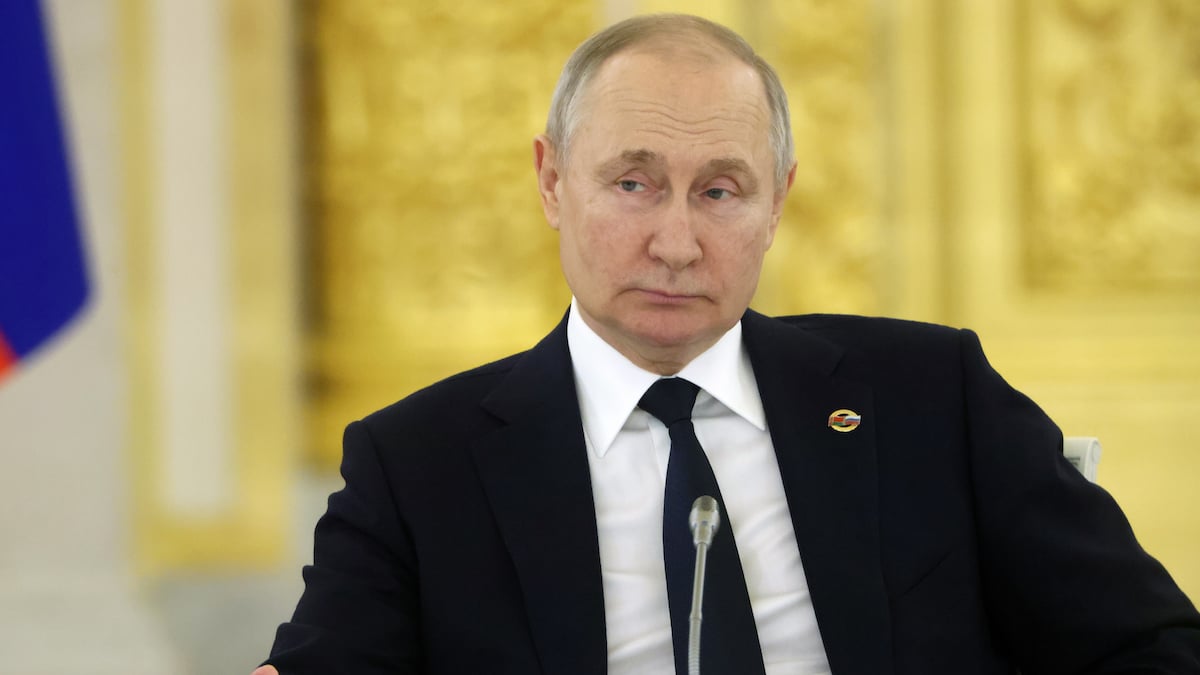While much of the coverage of Donald Trump’s election has focused on what that means for domestic issues, his re-ascension to the White House also has massive foreign policy implications. This is especially true of U.S relations with Russia.
Trump has long been considered to be a lackey of Russian president Vladimir Putin. His deep, unsettling ties to the Russian state have been heavily documented, and during his presidency, it was revealed that at least 17 Trump associates had contacts with prominent Russians or organizations deemed to be in collusion with that country’s political machinery. In fact, it has even been claimed by reliable sources that Trump was cultivated as a Russian asset as early as the ‘80s. And that’s before we get to the disinformation campaigns run by Russians that have helped Trump into power twice.
With all of this in mind, it makes sense that Ukrainians saw Trump’s recent election win as truly harrowing news. Many in the country and in the E.U. believe that Trump will not only allow Putin and Russia to be more assertive in their war effort, but actively help the despotic leader to achieve his territorial aims.
As Joe Biden is still in the White House, that shift of American policy to be less interventionist when it comes to the Russia-Ukraine war hasn’t yet happened. In fact, per Reuters, the president recently allowed Ukraine to use long-range, U.S-made ATACMS missiles to strike deep into Russian territory for the first time since the former superpower attempted to take over the smaller country.
As a result, Putin lowered the threshold for a nuclear strike so that the deadly weapons could be used in response to conventional attacks on Russia or Belarus. In previous months, Russia has also claimed that allowing this kind of strike effectively means NATO members are now at war in Ukraine too, which would mean that Moscow must retaliate.
Does this mean that the U.S is at war with Russia?
Is the U.S. at war with Russia?
The short answer is no, the U.S is not at war with Russia at time of writing.
However, Biden’s recent decision to allow Ukraine to use U.S.-made long-range missiles has certainly escalated tensions between the two countries.
“We will be taking this as a qualitatively new phase of the Western war against Russia and we will react accordingly,” said Segei Lavrov, Putin’s foreign minister (as per Reuters). He also added that U.S. data and personnel must have been used to plan and execute the attack. This, in theory, means that Russia could argue a NATO country has breached Russian territory, which would effectively be justification for retaliation.
Why did Ukraine fire long-range missiles into Russia?
While Trump’s election was likely to have been a catalyst for this decision, there are other factors involved.
For one, the war in Ukraine has been escalating in recent weeks, with Russia advancing into Ukrainian territory at their fastest pace since the beginning of the conflict. It makes sense that, in reaction to this threat, Ukraine and their president, Volodymyr Zelenskyy, would seek to damage Russia in ways they have previously been unable to do so. And, with Biden giving the go-ahead for the use of these weapons, it was only a matter of time before previously unattainable Russian targets were aimed at.
As per CNN, the missiles were fired at military targets. While Russia has confirmed the attack, Zelenskyy neither confirmed nor denied the launch, instead stating:
“Ukraine has long-range capabilities. Ukraine has long-range drones of its own production. We now have a long ‘Neptune’ (Ukrainian cruise missiles) and not just one. And now we have ATACMS. And we will use all of this.”
Russia claimed to have shot down five of the six missiles, with the other being allegedly too damaged to find its target properly. However, it has been reported that fragments from the damaged missile fell onto the target and caused a small fire.
Is Russia going to attack the U.S.?
Despite Putin’s saber-rattling around using nuclear weapons, and the heightened tensions, it is still highly unlikely that Russia will attack the U.S. For one, Putin is about to have a friendly president take charge, so to escalate at this stage would be detrimental to his long-term plans. Plus, there’s the whole nuclear anhialation thing.
With that said, diplomats from the Kremlin have compared this moment to the Cuban Missile Crisis, which is widely recognized as the point in history when Russia (then the U.S.S.R) and America came closest to fully-fledged nuclear warfare. And, while that is likely to just be talk, it is still a very worrying prospect that the current situation is being discussed in this way.
So, while the U.S. and Russia aren’t quite on the warpath yet, many believe it’s as close to happening as it’s been in decades.
